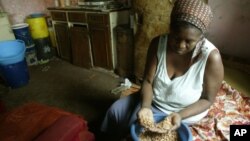A recent survey conducted by the Zimbabwe National Statistics Agency indicates that three quarters of Zimbabweans are poor with Matabeleland North having the largest number of people gripped by poverty.
The statistics were revealed at meeting in Bulawayo to discuss an Zimbabwe Interim Poverty Reduction Strategy Paper being drafted by various stakeholders.
Out of the country’s 10 provinces, the figures show that Matabeleland North 80 percent of the population is generally poor white 40 percent are living under abject poverty.
With general household poverty at nearly 71 per cent and extreme poverty at about 19 per cent, Matabeleland South is ranked third, while the Bulawayo Metropolitan province has the least percentages for both general and extreme poverty levels countrywide.
National coordinator of the poverty reduction initiative, Jasmine Chipika, said although the numbers of households as well as individuals in general and extreme poverty have been lessening over the years, most Zimbabweans remain poor.
She attributed the trend mainly to the continued existence of an economy characterized by duality, in which a small formalized segment co-exists with a highly marginalized and largely poor rural sector.
“These high levels of poverty seem to be a structural feature in the country. There must be something very deep-rooted in our economy which is sustaining these high poverty levels and we suspect it’s the dualistic nature of the economy … A large majority of people bunched in the rural areas where there is very little economic activity.
“We also note that while poverty can be structural, there is also a version of it which can be caused by our own policy making. If you put certain policies in a country and they don’t work, even people who were not poor can become poor.”
The study also states that employment in the country’s formal sector has drastically dwindled due to company closures and downsizing owing to economic decline, which in turn has compelled workers to join the informal sector. It notes that informal employment is generally associated with high vulnerability to poverty.
Chipika said while the survey shows that the country registered relatively high employment levels of 80.4% in 2014, the quality of employment is low, resulting in low incomes and the subsequent perpetuation of poverty.
“We are engaged in low economic productivity jobs. For example, graduates selling airtime in the informal sector. You are measured as a person engaged in economic activity but when we look at your poverty indicators you are still poor. So, we need to resolve the nature and quality of employment in the country.”
The government has often touted the high percentages of people in the informal sector as showing that most Zimbabweans are employed but observers have noted that such employment is not gainful.
Western region chairperson Reason Ngwenya of the Zimbabwe Congress of Trade Unions (ZCTU), who attended the meeting held in the city this week, says the economic situation in Zimbabwe has resulted in few individuals getting rich while the majority remains poor.
“In Zimbabwe today, there are the extremely rich people who constitute about 10 per cent or less of the population, and there are the extremely poor people, who are 90 per cent or more. What we are saying as ZCTU is that in any economy the middle class is the economic driver. Those who are rich today are not prepared to part with their money; they are not prepared to invest. I can say most of them are mere looters.”
The leader of Women of Zimbabwe Arise, Jenny Williams, who also attended the meeting, said some of the country’s economic problems can be blamed on poor governance.
Chipika said government, in collaboration with the World Bank, decided to embark on a national consultative process on poverty reduction in order to get input from various stakeholders as this is the first time such a program is being done in the country.
The program is said to be part of a raft of measures agreed to between Zimbabwe and multi-lateral finance institutions and are aimed at helping revive the economy.
The interim poverty reduction program is supposed to start from this year until 2018 when a five-year program is expected to be put in place.






